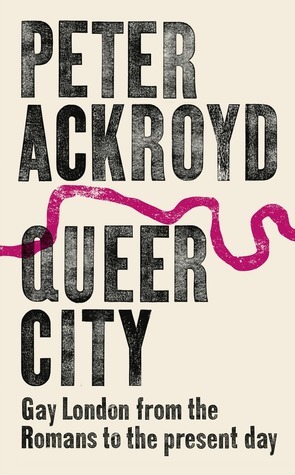
Queer City: Gay London from the Romans to the present day
by Peter Ackroyd
Genres: History, Non-fictionPages: 247
Rating:

Synopsis:In Queer City Peter Ackroyd looks at London in a whole new way – through the history and experiences of its gay population.
In Roman Londinium the city was dotted with lupanaria (‘wolf dens’ or public pleasure houses), fornices (brothels) and thermiae (hot baths). Then came the Emperor Constantine, with his bishops, monks and missionaries. And so began an endless loop of alternating permissiveness and censure.
Ackroyd takes us right into the hidden history of the city; from the notorious Normans to the frenzy of executions for sodomy in the early nineteenth century. He journeys through the coffee bars of sixties Soho to Gay Liberation, disco music and the horror of AIDS.
Today, we live in an era of openness and tolerance and Queer London has become part of the new norm. Ackroyd tells us the hidden story of how it got there, celebrating its diversity, thrills and energy on the one hand; but reminding us of its very real terrors, dangers and risks on the other.
Peter Ackroyd’s Queer City feels a bit like a list, somehow. There is analysis there, but it really just feels like a long list of evidence, sources, people — and mostly people being punished for being queer, in some sections, because that’s the only evidence he found. I found it a quite tedious read, unfortunately, despite the boistorous gay scene he describes.
…And mourns, as he seems to feel that queerness being more acceptable (more acceptable when he wrote this than now, in some ways) has led to a loss, to a vigorous community settling down. It’s not clear he thinks that’s a good thing, as a gay man himself.
I would give three warnings about this:
1. He defines “queer” weirdly and incorrectly as being a catch-all term for people who are unsure where they stand. I promise you, I’m very sure, but refer to myself as queer because I prefer it for a number of reasons. It’s a plastic term and often an umbrella term, and it doesn’t mean what he said it means. At other times he uses it differently, but I definitely sat up and took notice when he defined “queer” that way, i.e. definitely wrongly. Someone who says they’re queer might mean that they don’t know exactly what to call themselves, but that doesn’t mean that holds for everyone who is queer.
2. Where he’s ostensibly discussing gay men, he’s often discussing paedophilia and rape, instead. He makes no distinction between the two. He doesn’t offer comment on it or judge it.
3. The final chapter-ish hasn’t aged very well; there’s something rather sceptical about his tone towards the spectrum of gender queerness, and he also clearly does not foresee the tide of transphobia that has left Britain (and therefore London, the “queer city” he focuses on) to be referred to as “TERF Island”. I got the sense that he might be one of those people who think it’s gone “too far” himself.
Overall, I didn’t find it enjoyably written, and I also have… questions… about the author’s opinions.
Rating: 1/5
